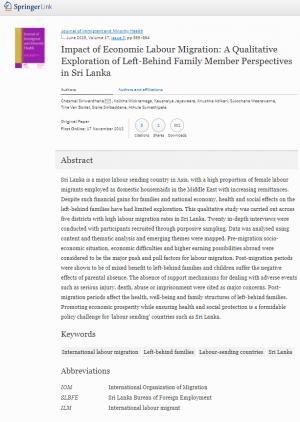Sri Lanka is a major labour sending country in Asia, with a high proportion of female labour migrants employed as domestic housemaids in the Middle East with increasing remittances. Despite such financial gains for families and national economy, health and social effects on the left-behind families have had limited exploration. This qualitative study was carried out across five districts with high labour migration rates in Sri Lanka. Twenty in-depth interviews were conducted with participants recruited through purposive sampling. Data was analysed using content and thematic analysis and emerging themes were mapped. Pre-migration socio-economic situation, economic difficulties and higher earning possibilities abroad were considered to be the major push and pull factors for labour migration. Post-migration periods were shown to be of mixed benefit to left-behind families and children suffer the negative effects of parental absence. The absence of support mechanisms for dealing with adverse events such as serious injury, death, abuse or imprisonment were cited as major concerns. Post-migration periods affect the health, well-being and family structures of left-behind families. Promoting economic prosperity while ensuring health and social protection is a formidable policy challenge for ‘labour sending’ countries such as Sri Lanka.

Impact of Economic Labour Migration: A Qualitative Exploration of Left-Behind Family Member Perspectives in Sri Lanka
Author/s: Chesmal Siriwardhana, Kolitha Wickramage, Kaushalya Jayaweera, Anushka Adikari, Sulochana Weerawarna, Tine Van Bortel, Sisira Siribaddana, Athula Sumathipala
Year:
Language: English
Publication Type: Scientific Report (Journal)(External)
Download this Publication
Year:
Language: English
Publication Type: Scientific Report (Journal)(External)
Download this Publication
Description
Region/Country (by coverage)
Publisher
Springer US
Project Type